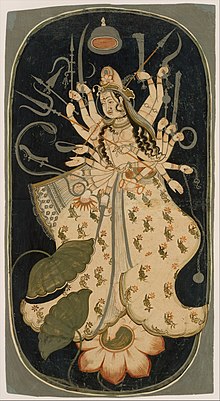Adi Parashakti
| Mahadevi | |
|---|---|
Greatest goddess of all three citadels and mother Goddess | |
 महादेवी माता | |
| Devanagari | महादेवी |
| Sanskrit transliteration | Mahādevī |
| Affiliation | Devi, Adi Parashakti, Parvati, Saraswati , Mahalakshmi, Tridevi, Durga[1] |
| Abode | Manidvipa |
| Mantra | Sarva Mangala Mangalye Shive Sarvaartha Saadhike Sharanye Trayambake Gauri Narayani Namostute |
| Weapon | Sudarshana Chakra, conch, trident, bowl, noose, goad, spear, Vajra, bow, arrow, sword, shield, rudraksha, kamandal, staff, bell, mace, lotus, |
| Mount | Varies by iconographic form |
| Consort | Shiva |
In Hinduism, Mahadevi (Sanskrit: महादेवी, IAST: Mahādevī) or "Great Goddess" is the goddess or Devi that is the great goddess of all other devis – an all-encompassing female deity[2] as the consort of Great God [[Vishnu]] or the Ultimate Reality (Brahman) in Shaktism.
She is identified with Parvati, Mahalakshmi, or the Tridevi. These changes on who her consort is are related to the rivalry between Shaivism and Viahsnism and the mixture of Shaktism and Shaivism through the popular form, though there are texts which state it is Vishnu who is the consort of the Goddess. However, it is canon that Mahadevi, is none other than an incarnation of Adi Parashakti, the only controversy that arises from it is if the supreme Goddess is Parvati, Lakshmi, the Tridevi, or an entire sperate being.
Mahadevi is the supreme force that creates, preserves and destroys the universe. She is the highest intelligence referred as Brahmavidya. Mahadevi is the soul of the universe and the universe itself. She is the source of wealth, knowledge, forgiveness, peace, faith, fortitude, fame, modesty and mercy. The purans mention her as Nirguna Maheshwari Devi Mahamaya, meaning "the absolute truth", and mother of all. Along with Nirguna form Mahadevi is also mentioned as Sarguna (attributes) and Vagdevi (speech).
See also
Notes
- ^ Veena R. Howard (17 October 2019). The Bloomsbury Research Handbook of Indian Philosophy and Gender. Bloomsbury Publishing. p. 255. ISBN 9781474269605.
- ^ Tracy Pintchman. Seeking Mahadevi: Constructing the Identities of the Hindu Great Goddess. ISBN 0-7914-5008-2.
References
- Seeking Mahadevi: Constructing the Identities of the Hindu Great Goddess (ISBN 0-7914-5008-2) Edited by Tracy Pintchman
- Encountering The Goddess: A Translation of the Devi-Mahatmya and a Study of Its Interpretation (ISBN 0-7914-0446-3) by Thomas B. Coburn
- In Praise of The Goddess: The Devimahatmyam and Its Meaning (ISBN 0-89254-080-X) by Devadatta Kali
- The Triumph of the Goddess: The Canonical Models and Theological Visions of the Devi-Bhagavata Purana (ISBN 0-7914-0363-7) by C. MacKenzie Brown
- The Srimad Devi Bhagavatam (ISBN 81-215-0591-7) translated by Swami Vijnanananda

